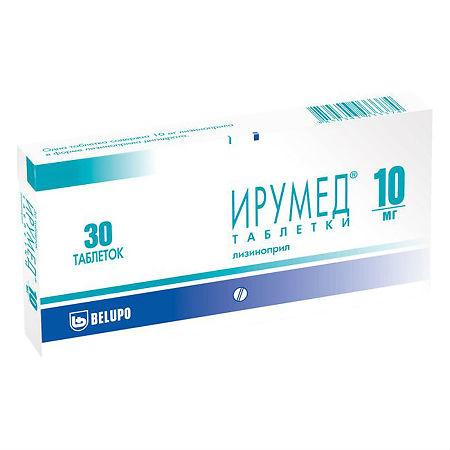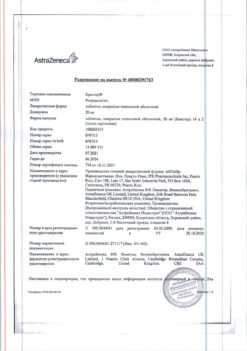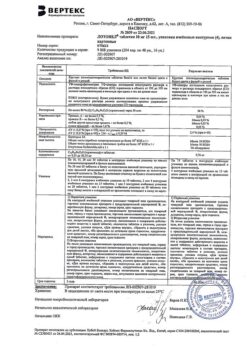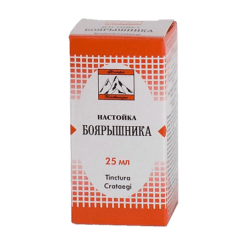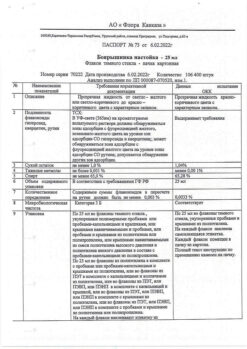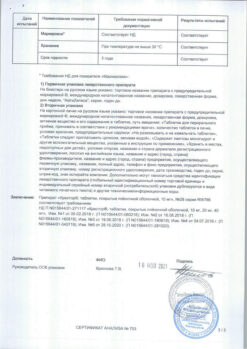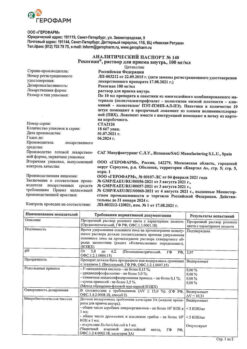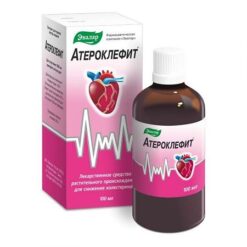No products in the cart.
Irumed, tablets 10 mg, 30 pcs.
€1.00
Out of stock
(E-mail when Stock is available)
Description
Irumed is an ACE inhibitor. It is an antihypertensive drug. The mechanism of action is associated with inhibition of ACE activity, which leads to suppression of angiotensin II formation from angiotensin I and a direct reduction of aldosterone release. It reduces bradykinin degradation and increases prostaglandin synthesis.
Lysinopril reduces RPS, BP, preload, pulmonary capillary pressure, causes an increase in the minute blood volume and increases exercise tolerance in patients with chronic heart failure. Lisinopril has a vasodilator effect, with a greater degree of arterial dilatation than vein dilatation. Some effects are attributed to the effect on tissue renin-angiotensin systems. It improves the blood supply to the ischemic myocardium. Long-term use reduces myocardial hypertrophy and resistive arterial wall hypertrophy.
The use of ACE inhibitors in patients with heart failure leads to increased life expectancy; in patients who have had myocardial infarction without clinical manifestations of heart failure it slows the progression of left ventricular dysfunction.
The onset of action is noted 1 hour after taking the drug, the maximum effect is noted after 6-7 hours, the duration of action is 24 hours. In case of arterial hypertension the effect is noted in the first days after the start of treatment, the stable effect develops after 1-2 months.
Indications
Indications
– arterial hypertension, incl. renovascular (as monotherapy or in combination with other antihypertensive drugs);
– chronic heart failure (as part of combination therapy);
– acute myocardial infarction (in patients with stable hemodynamic parameters on the first day);
– diabetic nephropathy.
Pharmacological effect
Pharmacological effect
Irumed is an ACE inhibitor. Antihypertensive drug. The mechanism of action is associated with inhibition of ACE activity, which leads to suppression of the formation of angiotensin II from angiotensin I and to a direct decrease in the release of aldosterone. Reduces the degradation of bradykinin and increases the synthesis of prostaglandins.
Reduces peripheral vascular resistance, blood pressure, preload, pressure in the pulmonary capillaries, causes an increase in minute blood volume and increased exercise tolerance in patients with chronic heart failure. Lisinopril has a vasodilating effect, dilating arteries to a greater extent than veins. Some effects are explained by effects on tissue renin-angiotensin systems. Improves blood supply to ischemic myocardium. With long-term use, hypertrophy of the myocardium and the walls of resistive arteries decreases.
The use of ACE inhibitors in patients with heart failure leads to an increase in life expectancy; in patients who have suffered a myocardial infarction without clinical manifestations of heart failure – to slow the progression of left ventricular dysfunction.
The onset of action is noted 1 hour after taking the drug, the maximum effect is observed after 6-7 hours, the duration of action is 24 hours. In arterial hypertension, the effect is noted in the first days after the start of treatment, a stable effect develops after 1-2 months.
Special instructions
Special instructions
It should be taken into account that a pronounced decrease in blood pressure occurs with a decrease in fluid volume caused by diuretic therapy, with a decrease in salt in food, during dialysis, and in patients with diarrhea or vomiting. In patients with chronic heart failure with or without concurrent renal failure, symptomatic arterial hypotension may develop, which was more often detected in patients with severe heart failure, as a result of the use of large doses of diuretics, hyponatremia or impaired renal function. In such patients, treatment should be started under the strict supervision of a physician (with caution in selecting the dose of the drug and diuretics). Similar tactics should be followed when prescribing Irumed to patients with coronary artery disease or cerebrovascular insufficiency, in whom a sharp decrease in blood pressure can lead to myocardial infarction or stroke.
If a pronounced decrease in blood pressure develops, the patient should be placed in a horizontal position and, if necessary, a 0.9% sodium chloride solution should be administered intravenously. A transient hypotensive reaction is not a contraindication for taking the next dose of the drug.
When using Irumed, some patients with chronic heart failure, but with normal or low blood pressure, may experience a decrease in blood pressure, which is usually not a reason to stop treatment. If arterial hypotension becomes symptomatic, it is necessary to reduce the dose of the drug or discontinue treatment with Irumed.
In acute myocardial infarction, the use of standard therapy (thrombolytics, acetylsalicylic acid, beta-blockers) is indicated. Irumed can be used in conjunction with intravenous administration or with the use of transdermal nitroglycerin systems.
In patients with chronic heart failure, a pronounced decrease in blood pressure after initiation of treatment with ACE inhibitors may lead to a further deterioration of renal function. There have been cases of acute renal failure while taking ACE inhibitors. In patients with bilateral renal artery stenosis or arterial stenosis of a solitary kidney treated with ACE inhibitors, there was an increase in serum urea and creatinine, usually reversible after discontinuation of treatment (more common in patients with renal failure).
In patients taking ACE inhibitors, including lisinopril, angioedema of the face, extremities, lips, tongue, epiglottis and/or larynx rarely developed, and its development is possible during any period of treatment. In this case, treatment with Irumed should be stopped as soon as possible and the patient should be monitored until the symptoms completely regress. However, in cases where swelling occurs only on the face and lips and the condition most often normalizes without treatment, antihistamines may be prescribed.
If angioedema spreads to the tongue, epiglottis, or larynx, airway obstruction may occur and appropriate therapy and/or airway management should be initiated immediately. It was noted that in patients of the Negroid race taking ACE inhibitors, angioedema developed more often than in patients of other races. Patients with a history of angioedema not associated with previous treatment with ACE inhibitors may be at increased risk of developing it during treatment with Irumed.
In patients taking ACE inhibitors, during desensitization to hymenoptera (wasps, bees, ants and other hymenoptera), an anaphylactoid reaction can extremely rarely develop. This can be avoided by temporarily stopping ACE inhibitor treatment before each desensitization.
It should be taken into account that patients taking ACE inhibitors and undergoing hemodialysis using high-permeability dialysis membranes may develop an anaphylactic reaction. In such cases, the use of a different type of dialysis membrane or another antihypertensive drug should be considered.
When using ACE inhibitors, a cough is observed (dry, prolonged, which disappears after stopping treatment with the ACE inhibitor). In the differential diagnosis of cough, cough caused by the use of an ACE inhibitor should also be taken into account.
When drugs that lower blood pressure are used in patients undergoing major surgery or during general anesthesia, lisinopril may block the formation of angiotensin II, secondary to compensatory renin release. The pronounced decrease in blood pressure, which is considered a consequence of this mechanism, can be eliminated by increasing the volume of circulating blood.
In some cases, hyperkalemia was observed. Risk factors for the development of hyperkalemia include renal failure, diabetes mellitus, and concomitant use of potassium-sparing diuretics (spironolactone, triamterene, or amiloride), potassium supplements, or salt substitutes containing potassium, especially in patients with impaired renal function. If it is necessary to use these combinations, the level of potassium in the blood serum should be regularly monitored.
In patients who are at risk of developing symptomatic hypotension (those on a low-salt or salt-free diet) with or without hyponatremia, as well as in patients who have received high doses of diuretics, the above conditions must be compensated for (loss of fluid and salts) before starting treatment.
Impact on the ability to drive vehicles and operate machinery
There is no data on the effect of Irumed, used in therapeutic doses, on the ability to drive vehicles and machines, however, it must be taken into account that dizziness may occur.
Active ingredient
Active ingredient
Lisinopril
Composition
Composition
1 table contains lisinopril dihydrate (in terms of lisinopril anhydrous) 10 mg.
Pregnancy
Pregnancy
The use of Irumed during pregnancy is contraindicated. Lisinopril penetrates the placental barrier.
If pregnancy occurs, treatment with Irumed should be stopped immediately, unless the benefit to the mother outweighs the potential risk to the fetus (the patient should be informed of the potential risk to the fetus). Taking ACE inhibitors in the second and third trimesters of pregnancy can cause death of the fetus and newborn.
Newborns may develop cranial hypoplasia, oligohydramnios, deformation of the bones of the skull and face, pulmonary hypoplasia, and impaired renal development. For newborns and infants whose mothers took ACE inhibitors during pregnancy, it is recommended to carefully monitor them for timely detection of a pronounced decrease in blood pressure, oliguria, and hyperkalemia.
There is no data on the penetration of lisinopril into breast milk. During treatment with Irumed, breastfeeding should be discontinued.
Contraindications
Contraindications
– history of angioedema (including when using ACE inhibitors);
– hereditary angioedema;
– age under 18 years (efficacy and safety have not been established);
– pregnancy;
– hypersensitivity to lisinopril and other ACE inhibitors;
The drug should be prescribed with caution in aortic stenosis, hypertrophic cardiomyopathy, bilateral renal artery stenosis, arterial stenosis of a single kidney with progressive azotemia, in the condition after kidney transplantation, primary hyperaldosteronism, arterial hypotension, bone marrow hypoplasia, hyponatremia (increased risk of arterial hypotension in patients on a low-salt or salt-free diet), hyperkalemia, conditions accompanied by a decrease in circulating blood volume (including diarrhea, vomiting), connective tissue diseases (including systemic lupus erythematosus, scleroderma), diabetes mellitus, gout, hyperuricemia, coronary artery disease, cerebrovascular insufficiency, elderly patients.
Side Effects
Side Effects
The most frequently reported symptoms were dizziness, headache, nausea, diarrhea, fatigue, and cough.
The following side effects have been reported rarely.
From the cardiovascular system: marked decrease in blood pressure, chest pain, orthostatic hypotension, tachycardia, bradycardia, worsening symptoms of heart failure, impaired AV conduction, myocardial infarction.
From the digestive system: abdominal pain, dry mouth, dyspepsia, anorexia, change in taste, pancreatitis, hepatocellular or cholestatic hepatitis, jaundice, increased activity of liver transaminases, hyperbilirubinemia.
From the side of the central nervous system: mood lability, confusion, paresthesia, drowsiness, convulsive twitching of the muscles of the limbs and lips, asthenic syndrome, confusion.
From the respiratory system: dyspnea, bronchospasm, apnea.
From the skin: urticaria, sweating, hair loss, photosensitivity.
From the hematopoietic organs: leukopenia, thrombocytopenia, neutropenia, agranulocytosis, anemia (decreased hematocrit, erythrocytopenia).
From the genitourinary system: uremia, oliguria/anuria, impaired renal function, acute renal failure, decreased potency.
Allergic reactions: angioedema of the face, extremities, lips, tongue, epiglottis and/or larynx, skin rash, itching, fever, positive test results for antinuclear antibodies, increased ESR, eosinophilia, leukocytosis.
Other: hyperkalemia, hyponatremia, hyperuricemia, arthralgia, myalgia.
In most patients, side effects were mild and transient.
Interaction
Interaction
When Irumed is used simultaneously with potassium-sparing diuretics (spironolactone, triamterene, amiloride), potassium supplements, salt substitutes containing potassium, the risk of developing hyperkalemia increases, especially in patients with impaired renal function.
When Irumed is used simultaneously with diuretics, a pronounced decrease in blood pressure is observed.
When Irumed is used simultaneously with other antihypertensive drugs, an additive effect is observed.
With simultaneous use of Irumed with NSAIDs and estrogens, the antihypertensive effect of lisinopril is reduced.
When Irumed is used simultaneously with lithium, the elimination of lithium from the body slows down.
With simultaneous use of Irumed with antacids and cholestyramine, the absorption of lisinopril in the gastrointestinal tract is reduced.
No significant pharmacokinetic interactions were identified when lisinopril was used in conjunction with propranolol, digoxin or hydrochlorothiazide.
Overdose
Overdose
Symptoms: marked decrease in blood pressure.
Treatment: it is necessary to induce vomiting and/or lavage the stomach, followed by symptomatic therapy aimed at correcting dehydration and disturbances in water-salt balance.
In case of arterial hypotension, an isotonic solution should be administered and vasopressors should be prescribed. Hemodialysis may be used.
Symptoms: marked decrease in blood pressure.
Storage conditions
Storage conditions
At a temperature not exceeding 25 °C
Shelf life
Shelf life
3 years
Manufacturer
Manufacturer
Belupo, medicines and cosmetics d.d., Croatia
Additional information
| Shelf life | 3 years |
|---|---|
| Conditions of storage | At a temperature not exceeding 25 °C |
| Manufacturer | Belupo,medicines and cosmetics d.d., Croatia |
| Medication form | pills |
| Brand | Belupo,medicines and cosmetics d.d. |
Related products
Buy Irumed, tablets 10 mg, 30 pcs. with delivery to USA, UK, Europe and over 120 other countries.

